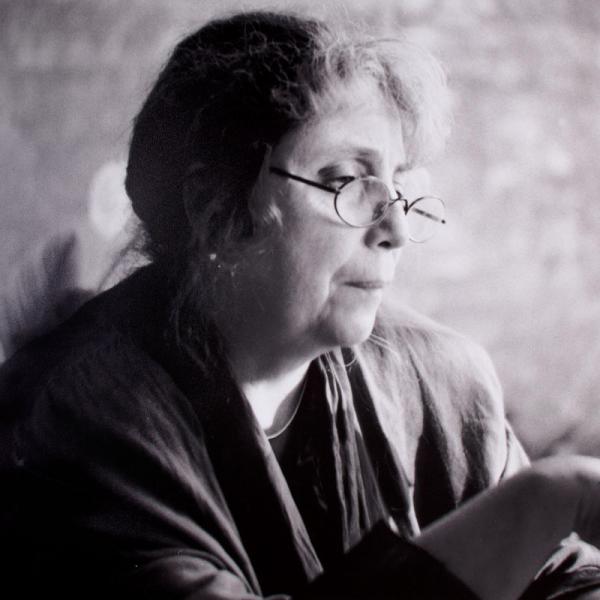Remembering Catharine Nepomnyashchy
We were deeply saddened to learn that Catharine Nepomnyashchy passed away on Saturday, March 21. You can read the statement from Barnard College and from the Harriman Institute. Additionally, a memorial service will be held for Professor Nepomnyashchy on Friday, October 2, 2015 (2pm) in the James Memorial Chapel at Union Theological Seminary (3041 Broadway at 121st St). The service will be followed by a reception at the Diana Center (3009 Broadway at 119th St), Barnard College.
You can also read the Harriman Institute's 2012 profile of Professor Nepomnyashchy. You can find her writing on www.cathynepomnyashchy.com Below is a remembrance by David Goldfarb that he posted on Facebook which we republish here with his permission.
By David A. Goldfarb
 While I taught in the Slavic Department at Barnard College from 1998-2007, Cathy Nepomnyashchy served in a very short period of time and in overlapping terms as Department Chair, Director of the Harriman Institute, President of AATSEEL, member of the Board of Directors of ASEEES (or maybe it was still AAASS), and head of the Slavic Division at MLA, definitively earning the title “Empress of All the Russias.” Colleagues outside the Barnard/Columbia orbit may not have all realized how significant it was for a woman and for a faculty member appointed to a Barnard department to be the Director of an old-boys’ club like the Harriman Institute, which had the largest endowment of any institute in the humanities on the Columbia campus at the time and was more the denizen of historians and social scientists than specialists in language and literature. Cathy’s institutional presence raised the profile of the Slavic Department in the Barnard context enormously and magnified our case to the administration that, though we were a tiny department that produced only a few majors a year, we more than made up in quality of students and faculty both, what we lacked for quantity.
While I taught in the Slavic Department at Barnard College from 1998-2007, Cathy Nepomnyashchy served in a very short period of time and in overlapping terms as Department Chair, Director of the Harriman Institute, President of AATSEEL, member of the Board of Directors of ASEEES (or maybe it was still AAASS), and head of the Slavic Division at MLA, definitively earning the title “Empress of All the Russias.” Colleagues outside the Barnard/Columbia orbit may not have all realized how significant it was for a woman and for a faculty member appointed to a Barnard department to be the Director of an old-boys’ club like the Harriman Institute, which had the largest endowment of any institute in the humanities on the Columbia campus at the time and was more the denizen of historians and social scientists than specialists in language and literature. Cathy’s institutional presence raised the profile of the Slavic Department in the Barnard context enormously and magnified our case to the administration that, though we were a tiny department that produced only a few majors a year, we more than made up in quality of students and faculty both, what we lacked for quantity.
Cathy encouraged me to become active outside the American sphere, presenting at conferences in the UK, at ICCEES in Tampere, and meeting a whole world of Slavists who didn’t often make it to AAASS/ASEEES, AATSEEL, or MLA. As we could clearly see that distance learning was going to play an increasing role in what we did as teachers, she gave me a fabulous opportunity to develop a humanities course with her for the East European Studies Online M.A. degree at the Freie Universität Berlin. We made a great team for this task, as she had such a wide ranging network of connections and insights as a specialist in Soviet and Post-Soviet literature, while I worked specifically on East-Central Europe, which was the core content of the program, so we could really do things like bounce Sinyavsky off of Miłosz and bring a wide range of reference and depth to that discussion. Since the students were scattered all over the globe, except for two weeks in Berlin each year, we couldn’t present live lectures online, but we wrote introductory essays to each unit, providing reading materials, films, and images online, and ran discussion forums and assigned essays to the students. The in-house classes in Berlin were always the most exhilarating part of the course, because we were genuinely learning new things from each other and exploring new territory, bringing the students in to what we really did as scholars.
For all her professional expansiveness, Cathy was always one of the most humane, approachable, and down-to-earth people I’ve known in the field, devoting time she didn’t really have to students at all levels, and in the whirlwind of activity that always seemed to surround her, maintaining a genuine intellectual interest in whatever it was you happened to be working on.
